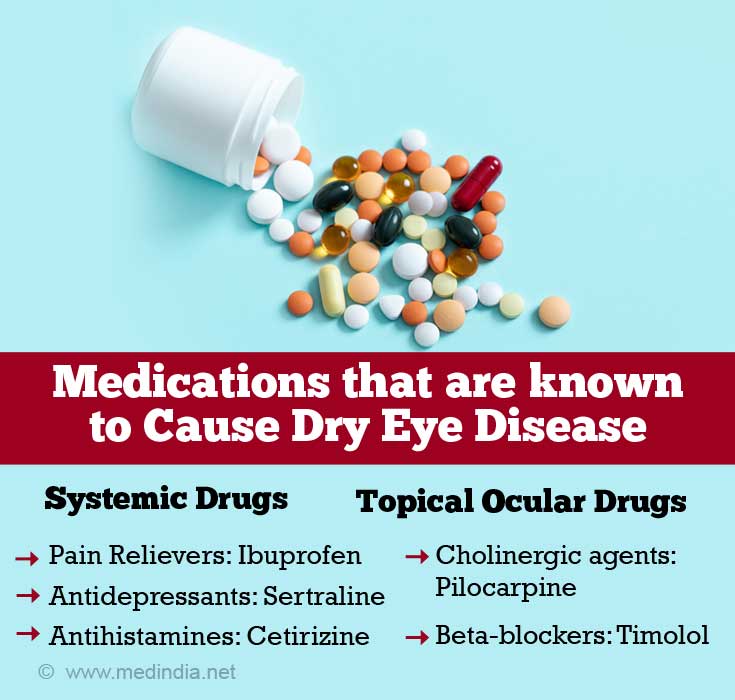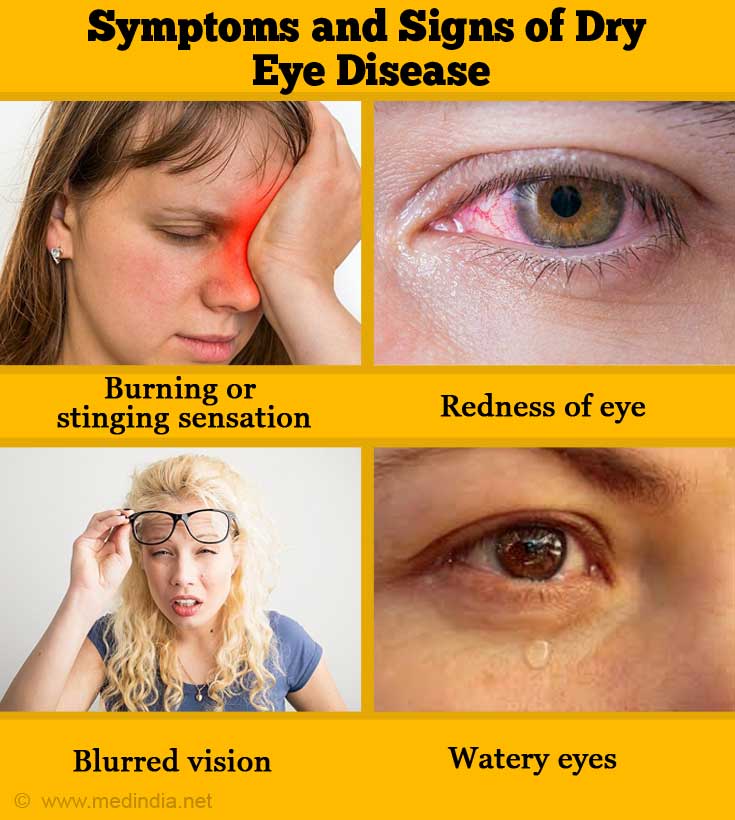- The Role of Medications in Causing Dry Eye - (https://www.ncbi.nlm.nih.gov/pmc/articles/pmc3459228/)
- Dry eyes can be exacerbated by systemic antihypertensive medication - (https://www.ncbi.nlm.nih.gov/pubmed/22555237)
What is Dry Eye Disease?
Dry eye disease (DED) is a condition associated with the tears or ocular surface, wherein the tears are not able to provide adequate lubrication to the eye.
The common complaints in DED could be itching, burning sensation, foreign body sensation, blurred vision and at times tearing, which may lead to damage to the ocular surface. It may be accompanied by inflammation of the ocular surface. Dry eye disease, though uncomfortable, is not life-threatening.
The most common cause of Dry Eye Disease (DED) is the adverse effect of commonly prescribed therapeutic medications, which could be systemic or topical ocular medications. The therapeutic effect of these medicines or the preservatives present in these medications may cause DED.
Polypharmacy too could be a cause of dry eye disease. Polypharmacy means the use of five or more drugs which could be prescription or over-the-counter medications. These can interact with each other and lead to complex adverse effects like DED.
Some of the risk factors which make a patient more susceptible to dry eyes include decreased tear production in people above 50 years of age and in females due to hormonal changes, use of contact lenses, and consuming a diet low in vitamin A or omega-3 fatty acids.
Dry eyes could cause complications like increased risk of eye infections and damage to the surface of eyes- e.g. corneal abrasion, corneal ulcer or vision problems.
What are the Medications that are known to Cause Dry Eye Disease?
Systemic or topical medications can cause or aggravate dry eye disease.
Some of the systemic medications that are known to cause dry eye disease are:
Analgesics or Pain Relievers
- Ibuprofen
- Acetaminophen
Antidepressants
- Sertraline
- Paroxetine
- Amitriptyline
Antihistamines
- Cetirizine
- Fexofenadine
- Loratadine
Antihypertensives (Blood pressure medications)
- Acebutolol
- Atenolol
- Hydrochlorothiazide
Nasal Decongestants
- Phenylephrine
- Pseudoephedrine
- Oxymetazoline
Diuretics (Drugs to increase urine output)
- Furosemide
- Hydrochlorothiazide
Antipsychotics
- Fluphenazine
- Prochlorperazine
- Quetiapine
- Promethazine
Antiarrhythmics(Medication which prevents the development of abnormal heart rhythm)
- Metoprolol
- Propranolol
- Prazosin
Drugs for Parkinson’s disease
- Trihexyphenidyl
Birth Control Pills
- Hormonal Contraceptives with estrogens alone or in combination with progestins
Medications for Acne
- Isotretinoin
Antimalarial agents
- Chloroquine
The topical ocular drugs which can cause or aggravate DED are:
Cholinergic agents
- Pilocarpine
- Bimatoprost
Beta-blockers
- Timolol
- Betaxolol
Adrenergic agonist drugs
- Brimonidine
- Apraclonidine

What are the Symptoms and Signs of Dry Eye Disease?
Symptoms and signs of dry eye disease may include:
- Burning or stinging sensation in eyes
- Feeling of presence of foreign particle in the eye causing itching
- Redness of eye
- Sensitivity to light
- Uncomfortable feeling when wearing contact lenses
- Blurred vision
- Watery eyes
- Difficulty in night driving
- Eye fatigue

How do you Diagnose Dry Eye Disease?
A thorough investigation of the patient’s medical history is required to understand the symptoms and the likely cause of symptoms.
The tests and procedures could include:
- Eye examination – a thorough eye examination will help assess the general health of eye
- Measuring volume of tears – blotting strips are used to measure the volume
- Determining the quality of tears – dyes are used to assess the surface condition of eyes
A lot of research in the area of DED with respect to diagnosis is underway and the potential testing could include:
- Osmolarity
- Optical coherence Tomography
- Functioning of Meibomian Gland Test
These tests would provide a reliable method for diagnosing and predicting the dry eye disease.
What are the Treatment Options to overcome Dry Eyes Disease?
Symptoms usually go away when the drugs causing it are changed or if the dosage is reduced according to the doctor’s advice.
If the symptoms persist, over-the-counter eyedrops or lubricants or artificial tears can be used to ease symptoms of mild dry eye disease.
Some eyedrops contain preservatives; hence choose preservative-free eyedrops in consultation with the ophthalmologist if using them long-term.
Prescription medications too maybe advised to cure symptoms of dry eye disease, if the condition is severe.
- Eyedrops to reduce corneal inflammation- e.g. immuno-suppressants like Cyclosporine or Corticosteroids
- Ocular inserts which work like artificial tears
- Drugs to reduce inflammation – Antibiotics maybe given in the form of eyedrops, eye ointment or as oral medications
- Drugs to stimulate tears – Cholinergic drugs like Pilocarpine or Cevimeline help in producing tears
The other general treatment options could include:
- Conscious effort to blink more often
- Increasing the humidity in air by placing bowls of water in the room
What are the Tips to Overcome Dry Eyes?
The healthcare provider must alert the patient on medications which are known to cause or aggravate dry eye disease.
It is known that medications which cause dry mouth may also cause DED. Know the adverse effects of medications.
Cut the time you spend viewing screen—be it your smartphone, computer or TV. You tend to blink less when your eyes are glued to a screen and that can dry out your eyes.
Do not stay in airconditioned rooms for too long. Get some fresh air every now and then.
Patients who consume drugs known to cause dry eye disease must regularly undergo ophthalmological examinations.







